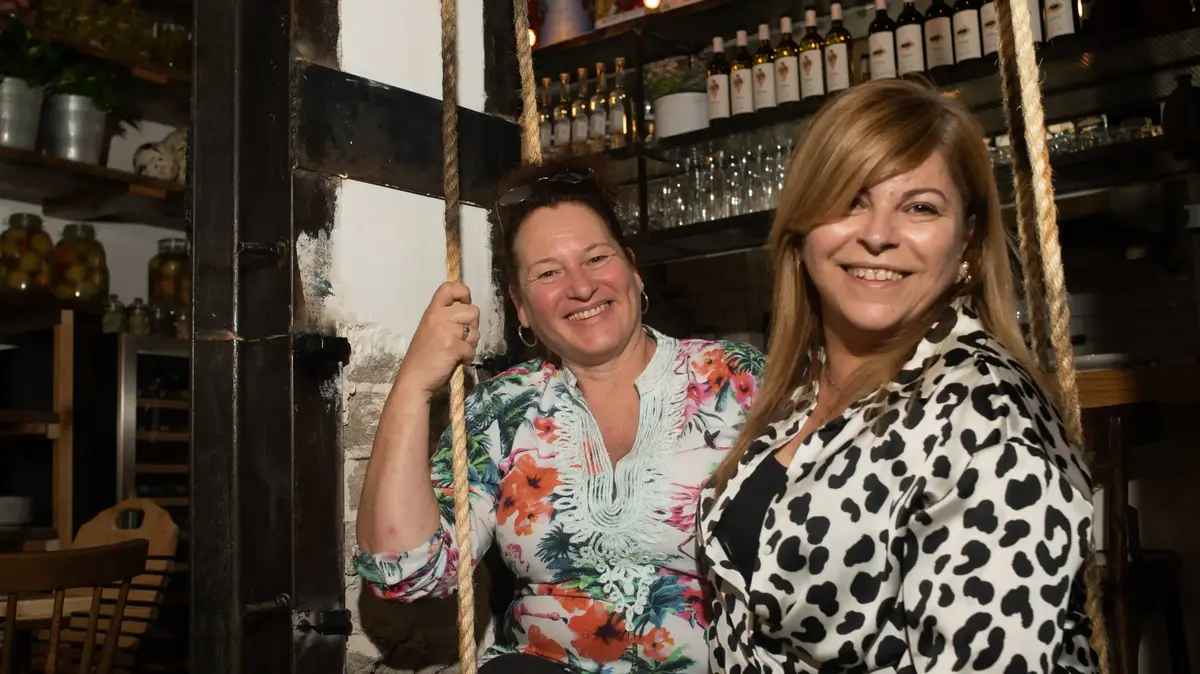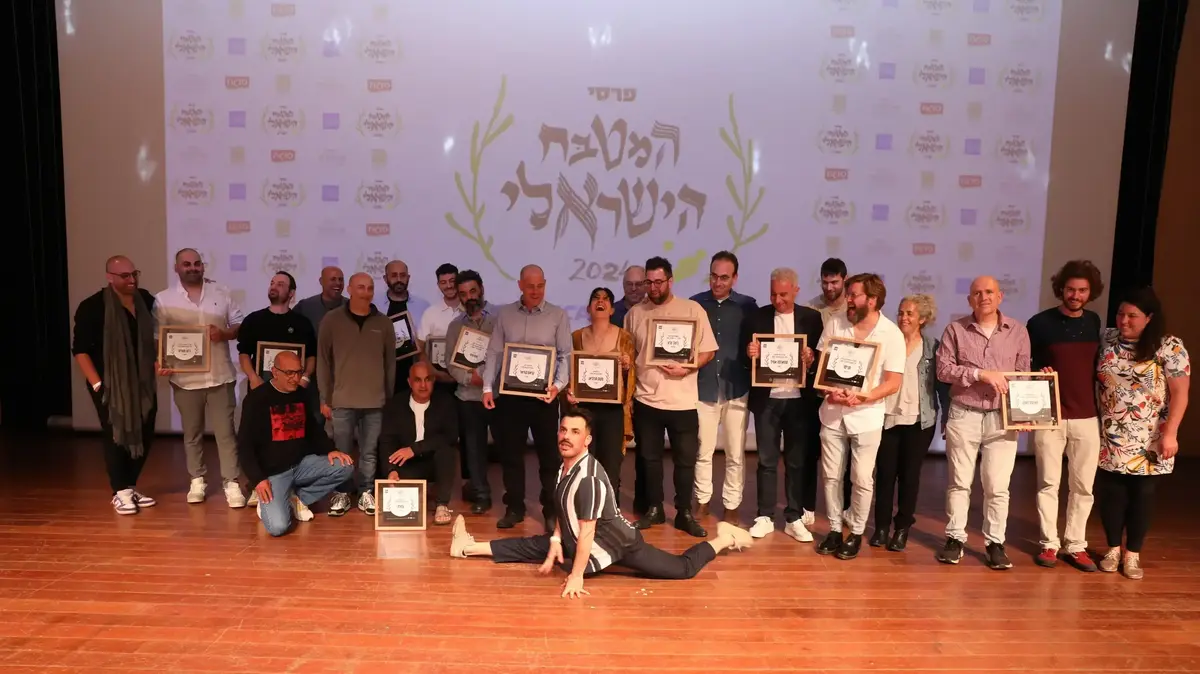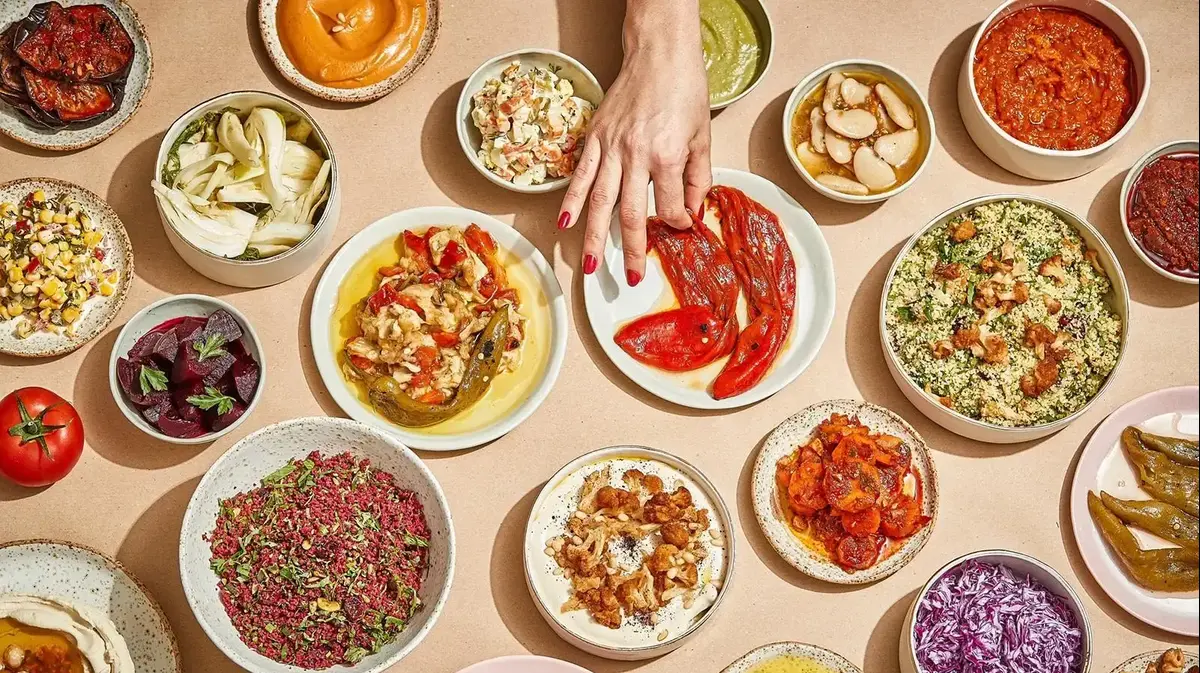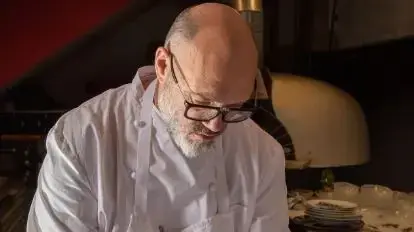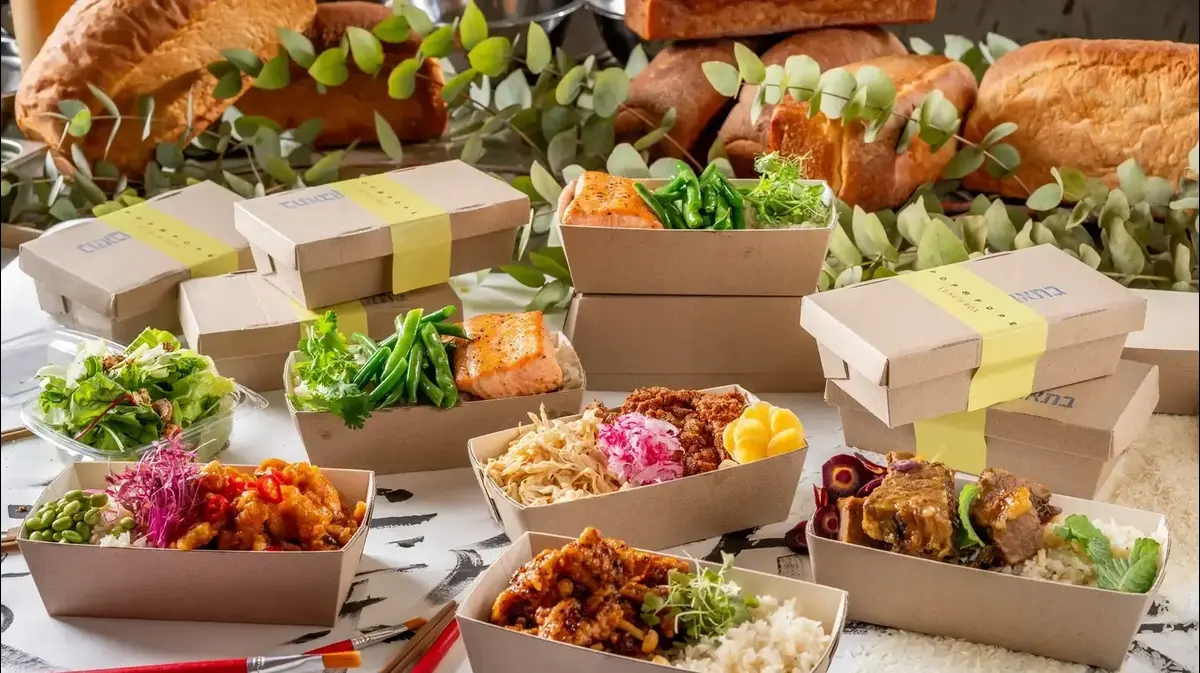Sanity women are still a minority in a world dominated by men, but sanity that are also restaurateurs, is already a really rare phenomenon.
Avivit Priel, the chef and owner of Osaria Restaurant and Osaria Next Generation and Luna Zreik who stands proudly as a chef and owner of Luna Restaurant in Nazareth, admits they did not stop for a moment to wonder if what they do is unique or different in the landscape, if they only stopped for a moment, they both agree, Were where they are today.
"It's not easy to be a chef and it's much harder to be a chef who owns the restaurant," Avivit states.
"In our profession, if you do not like with all your heart what you do, I do not believe that anyone can endure," adds Luna and Avivit laughs "This is my sentence. I hear you and I hear my sentences. This is what I always say. You can not survive This profession if you are not connected to it at all. Point. "
Luna and Avivit (Photo: Niv Aharonson)
They both grew up in the north of the country, not very far from each other. While Luna was born in a Christian Arab home, a descendant of a wealthy and privileged family from Nazareth and the granddaughter of the city's first mayor, Avivit was born and raised by the sea in Kiryat Motzkin to an Eastern European Jewish family.
Luna, whose heart has always been subject to the kitchen and cooking, grew up knowing that in the society to which she was born and the family from which she came, she would not be able to fulfill herself and her dream, and chose the path of a special education teacher. For years she worked with the deaf and blind until her father died. So she took it upon herself to take care of the family debts that the family did not know about before the father's death, and became a franchisee of a coffee shop branch in the Big Mall in Nazareth. After almost a decade of arduous work and after learning the secrets of restaurants, she allowed herself to fulfill the dream to which her heart has always been drawn and opened Luna Restaurant in the same place where the chain branch was located. The inverted coffee, sandwiches and breakfasts were replaced by exemplary stuffed grape leaves, shoshbarak dumplings in a hot yogurt-mint sauce, a fragrant and aromatic burger with lamb chops over burgul, patisserie stuffed with fresh spinach and sumac and more.
It was clear to Avivit from the beginning that cooking and restaurants are her life, that's what she wants to do and that's what she will do. After working in a number of kitchens, she opened a wine bar called Winona in the 1990s, but after two years was forced to close it due to the irresponsible financial conduct of a partner of the place. From there she moved to work as a hired chef at the Tapas Tapao Restaurant on Fourth Street and led the kitchen at the height of the place's fame and for a long time, until she helped have the courage to open her own place again.
Ozaria opened a little over nine years ago with partner Ofir Lami, a female partner, and probably not by chance.
In Ozaria, which is located in the center of the Lewinsky Market, with happy music in the background and usually glasses of ouzo, Avivit serves dishes that emphasize local ingredients and draws inspiration from Mediterranean countries and local cuisine.
From the vine leaves she actually makes a wonderful spread that is fun to put on the bread or roll sardines in them, the ravioli dumplings on the menu she creates from thin slices of beets filled with goat cheese cream, the calamari she serves with black beans and chipotle and alongside juicy Chinese kebabs with tomato confit and tahini Also eat a fresh leafy salad with seared veal almonds and fermented Nazareth spicy.
Vine sardines in Avivit Priel's ozeria
View this post on Instagram
A post shared by Ozeria Mediterranean Chef Restaurant (@ ouzeria.restaurant.tlv)
"The expectation from me is to be like a man in a woman's body"
"You know that every time we meet, I think how similar our appearance is, something in our structure, right?" Luna asks Avivit as they get together for a joint photo shoot in honor of the article. "You actually remind me of my childhood friend, the daughter of friends of the parents I grew up with and every time I see you I remember her." Avivit answers her.
The meeting between the two was born thanks to their participation in
the Israeli Cuisine Festival,
which begins this coming weekend and will last all month. The festival, which will include meals, tours and lectures by chefs and culinary people alongside Israeli olive oil events in honor of the harvest season and will end with the awarding of excellence awards to local culinary people, brings together for the first time the two sanity-restaurants for a joint meal.
But just before I approach you with the issue of the identity of Israeli cuisine,I am interested to know what characterizes your kitchen as women?
Spring:
"Non-forceful kitchen. In my life I have never thrown a plate back at anyone. In my life I have not been rude to the staff. I always take them to me, close up. Trying to explain, understand. "They understand that it is possible to run a kitchen even without force. My employees say about me - you never raise your voice, you never shout, but if you think something is done wrong, everyone knows. It's something in the silent rebuke."
Luna:
"It's due to appreciation. No need for force, a very great appreciation is enough. I hesitated at first. I was told I was too gentle with my employees, that I was not tough enough. As if the expectation from me is to be like a man in a woman's body. But what they do not understand is that I Can be more successful as a woman and in a woman's conduct. I should not be ashamed of it, on the contrary, this is my strength. I believe that the more you understand your employee, the more you embrace, hear, acquire the employee's trust, make him a family member, "To be good and to succeed. You magnetize him to you. I used to be afraid to admit that I am emotional, today I am proud. I am proud to treat employees as human beings, to work with the heart.
Dishes at the Luna restaurant in Nazareth
View this post on Instagram
A post shared by Matan Choufan Matan Chopin (@matanchoufan)
Why is it still harder today to find women in the field?
Avivit:
"In the social perception, even though we have advanced light years, we are still a patriarchal society. The society's expectation is completely different from us as women than male chefs and restaurateurs. Judgment is much greater and I encounter it many over the years. Towards yourself inside and also towards society. "
Luna:
"Punishing you. Giving you the feeling that you are not the perfect mother. It was not easy for me at all. The society I come from is even more patriarchal than the society Avivit grew up in. I really experienced it. As a teacher I was in the ideal position for mother and felt sacrificed myself and my dream, But when I was there no one complimented me and said to me, 'You are the perfect mother, how do you sacrifice yourself.' Are you coming back late at night? ' "Today I know that I gave my children a model. Especially my daughter and I am very proud of what I did. I hear from her how proud she is of me and that is what I think most."
Avivit:
"I hear Luna and I and hear myself. That's exactly how I feel. I'm glad to know I raised children who are proud of their mother. That my daughter knows she can be anything she chooses."
Luna:
"From this place I have a constant need to empower women next to me. It was important to me to bring to the restaurant Christian women from the city who would work, prepare the stuffed, the pastries, who would be proud of the work they do. I see them making tremendous strides between themselves, their husbands "Conservative women who come from a place that is pre-determined and have taken unbelievable steps to get out of this place and that satisfies me on tremendous levels."
"I hear Luna and I and hear myself" (Photo: Niv Aharonson)
For the meal menu they built together and will be served in the charming space of the Osaria Next Generation it was important for them to each bring their own kitchen while creating a dialogue between the dishes, a kind of connecting thread.
According to the design, the table will be filled with mazats and openings that are so characteristic of the two women's kitchen.
Afterwards, Luna's lamb meat will be served for the first course, along with raw fish ceviche with Avivit's beet sorbet.
For the main course, Avivit will serve an open lasagna of oxtail ragout, while Luna will serve her famous mansaf on bread soaked in saffron cooked in saffron.
Finally, the meal will be signed by two desserts spiced with Zahar water: Luna with basbosa topped with oshta cream - creamy milk cream topped with apricot jam from pistachios and pistachios and spring with milk-based Stolach ice cream and rice in citrus soup with caramel twill.
Stolach ice cream in citrus soup with twill caramel - Avivit's dessert at the joint meal (Photo: Niv Aharonson)
"When you say Palestinian food, it's rightly loads it with political meanings."
As we taste the jewels shaped like jewelry, stuffed with a stunning milky pistachio, which Luna brought to Avivit all the way from Nazareth, I ask them how they define their kitchen. For spring it is easier. She immediately describes her kitchen as Mediterranean, local, one that gives respect to the local, fine raw material we were blessed with. In Luna, however, the answer is more cautious. "We grow up here in a very charged situation, so sometimes when we want to define ourselves, we constantly think about how the one in front of us will not be harmed and how it will not hurt us either. My macro-level kitchen is the kitchen I call Greater Syria - from Syria through Lebanon to Palestinian cuisine "At the micro level, this is the local Christian kitchen I grew up on."
Are you afraid of not getting hurt and not getting hurt when you talk about your food?
"I feel that the culinary discourse is very charged and is constantly being charged. I would like all the reference to culinary work in the country to come from a place that is close. There will be recognition of all kitchens. Among all the memories of the people who lived the food, of the cuisine here - the Lebanese, Moroccan and Iraqi cuisine as well as the Palestinian. They all have memories of their cuisines. "The food in the political discourse. Leave this place that has so much warmth, memories and humanity."
Are you talking mainly about Palestinian food?
"When you say Palestinian food it's straight up it loads with political meanings. But there is a reality, and I can not ignore one of the local cuisines that grew up here. I think the strength of local cuisine is because it connects so many cultures."
And what about the issue of appropriation?
There are those who claim that Israeli cuisine has appropriated Palestinian cuisine.
"Here, too, of course, politics is the one that plays a role and intervenes. It does not have to rob anyone. I can not say that bolognese is not Italian, but everyone takes this bolognese elsewhere."
Avivit:
"I can not prepare a dish without taking it to my kitchen, to my place. Otherwise I will not feel comfortable. The extra meaning I put into the dish and the change I make to it, make the dish mine."
Basbosa with oshta, apricot jam from pistachios and pistachios, Luna's dessert (Photo: Niv Aharonson)
How do you see Israeli cuisine today?
Avivit
: "I think cuisine is a very important part of Israeli culture and culture, not only culinary is a culture in the making. We are a young country. There is a character that is crystallizing here, but it happens, it gets language. I went to cook in Copenhagen, Germany, USA, and there the people knew how to vote and say it was Israeli food. They, from the outside point of view, know how to recognize our culinary language, better than us who live it. As we do not always recognize that we have an accent, "So we also have a culinary accent. In the combination of flavors, in the range of colors, the extensive use of local vegetables. There is a local Israeli culinary language, even if it is difficult for us to identify and define it."
Luna:
"A culture is being formed that is a mix - an encounter of many cultures. This is its beauty and this is the strength of Israeli cuisine. If you look for a definition, I think the power of Israeli cuisine, its uniqueness, is the encounter of all cultures. If we know everyone, respect everyone "We will only gain an interesting and better kitchen."
For all American Express Israeli Festival Festival events

